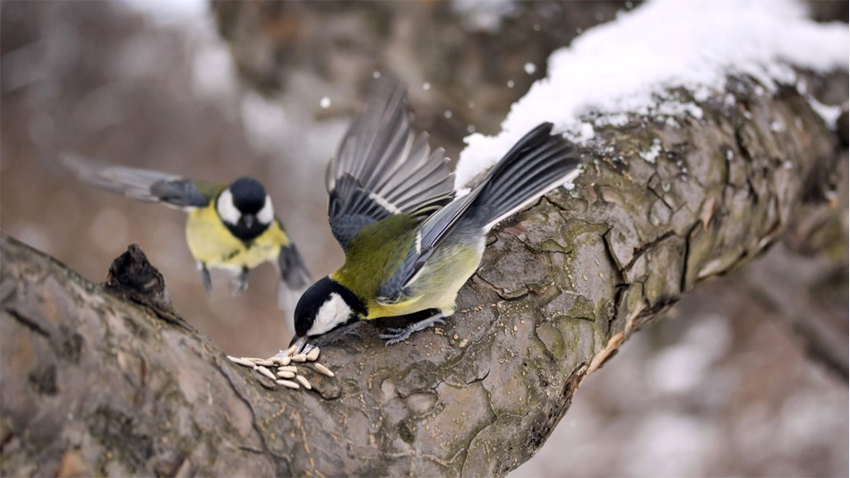We all love the singing of songbirds. Their tweets please the ear and create a cheerful mood. But as the snow blankets the earth we wonder how the little singers could survive and find food. Mind you that birds feel cold as well. Therefore the Bulgarian Society for the Protection of Birds (BSPB) has urged nature lovers to leave feeders with raw seeds in support of wild songbirds as they are looking for food in frosty weather. Great tits, Eurasian blue tits, coal tits, wood nuthatches, European robins, goldfinches, common chaffinches, greenfinches, sparrows and many other bird species will visit the feeder while for humans this is a great way to keep in touch with wild nature. This is in short the goal of the campaign “A grain of love”. Mariana Valcheva from BSPB told us more about it:
‘The campaign “A grain of love” of the Bulgarian Society for the Protection of Birds was born nine years ago when we wanted to show people from big towns and cities and from smaller towns and villages too, how we could help songbirds who remain with us during the winter. This is particularly important in winter days with thick snow when they have hard time trying to find food. These birds usually eat insects during the summer but during the winter they need more fatty seeds that would give them enough energy and make them warmer. By joining the campaign“A grain of love” everybody is able to easily help the nice winged residents of parks and gardens who come over to feeders to peck at some grains. The benefit is that we will be listening to their singing and watch them throughout the day. It is really important to realize is that if we have decided to feed these birds once, we should do that constantly, because they remember the place of feeders and will be coming over every day.’

How many people have joined the campaign?
‘Those whom we are aware of have marked their bird feeders on the interactive map of the BSPB website. A feeder can be put on the balcony, at the window, on a tree close to our home or in the park. So far the people who have marked the places of the songbird feeders are a little above 2000. I am sure that there are many people who are not aware of the interactive map or haven’t had the time to get checked in on it. The feedback that we receive from across Bulgaria suggests that the number of people willing to donate food to the songbirds in the winter is on the rise.’
‘It is simple to make a bird feeder and the job requires no special skills. I feed a large flock of sparrows and great tits. On my terrace I have placed a cardboard pad with seeds from raw unpeeled sunflower’, Mariana Valcheva also says. A hanging feeder is also easy to make and it is a wat to prevent doves from eating the seeds intended for songbirds. Here are the instructions. Tаke a dry plastic bottle. Put some sprigs at the bottom which stick out through the opening. Birds perch on them. Add seeds to the bottle and make small openings for birds to peck at the seeds. After that hang the bottle in a suitable place. This is a great way to both help songbirds in need and enjoy their company.
English Daniela Konstantinova
152 years after the death of the Apostle of Freedom, the personality of Vasil Levski continues to excite Bulgarians, regardless of whether they are in the country or abroad. The Embassy of Bulgaria in Athens, Greece , has extended an invitation to the..
Easter 2020 went down in history with two things. The first was the state of emergency, introduced due to the Covid-19 pandemic that imposed a number of restrictions on us, the consequences of which we are still recovering from. The..
At various times in its existence, the BNR's Directorate of Foreign Language Broadcasts, now known as Radio Bulgaria, the multimedia multilingual platform of Bulgarian National Radio, was more than just a workplace for a number of popular journalists...
Exactly a month after the Bulgarian National Radio solemnly celebrated its 90th anniversary, history continues its dialogue with us, its authors. With a..

+359 2 9336 661
